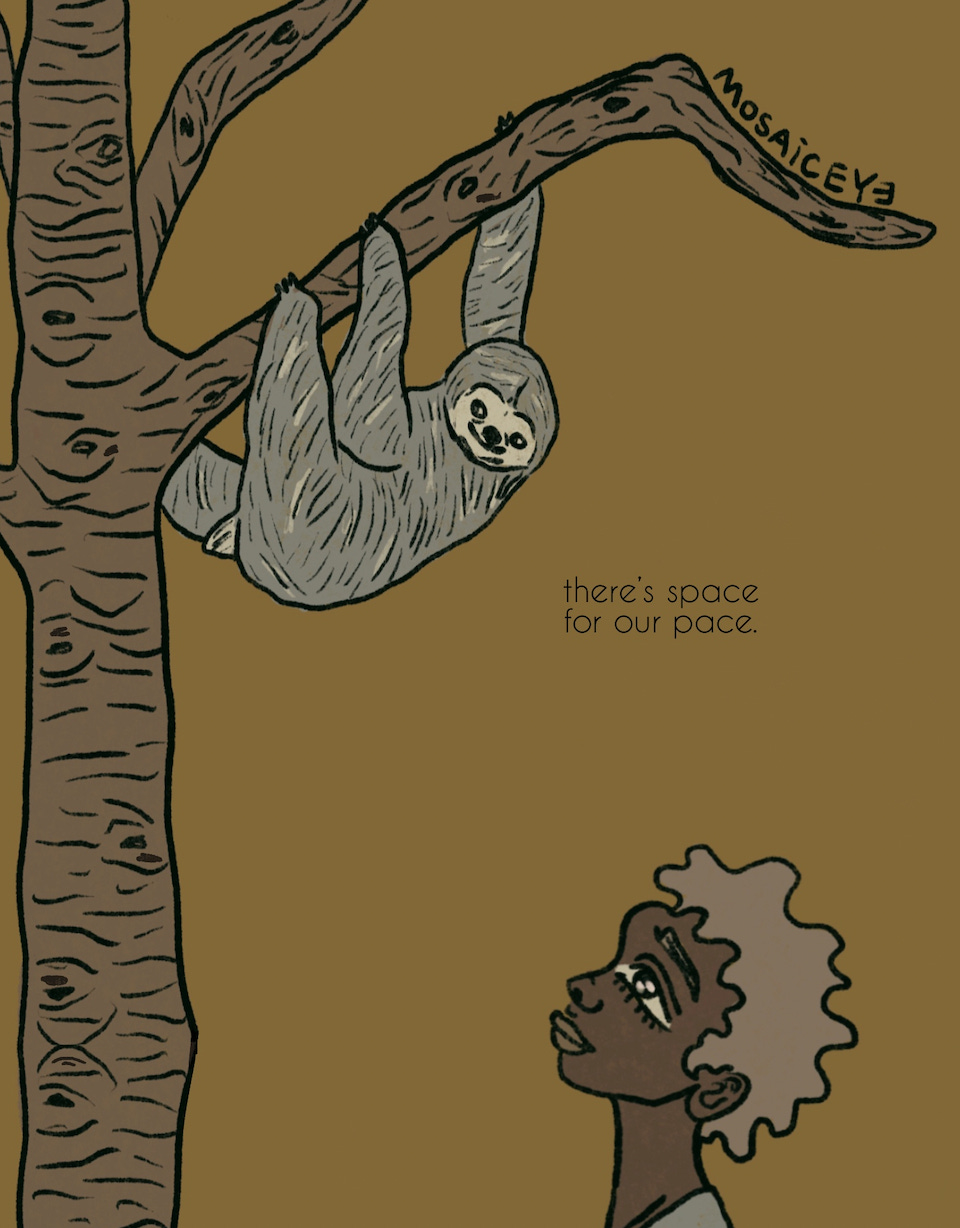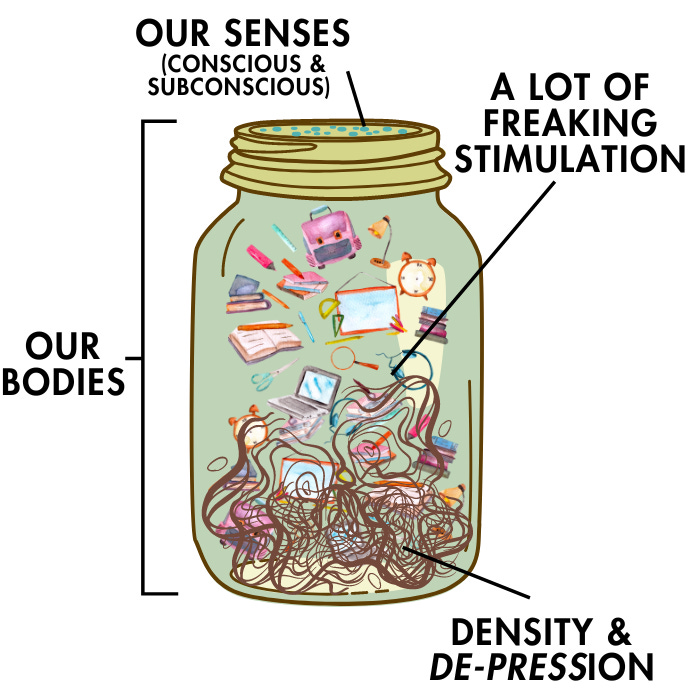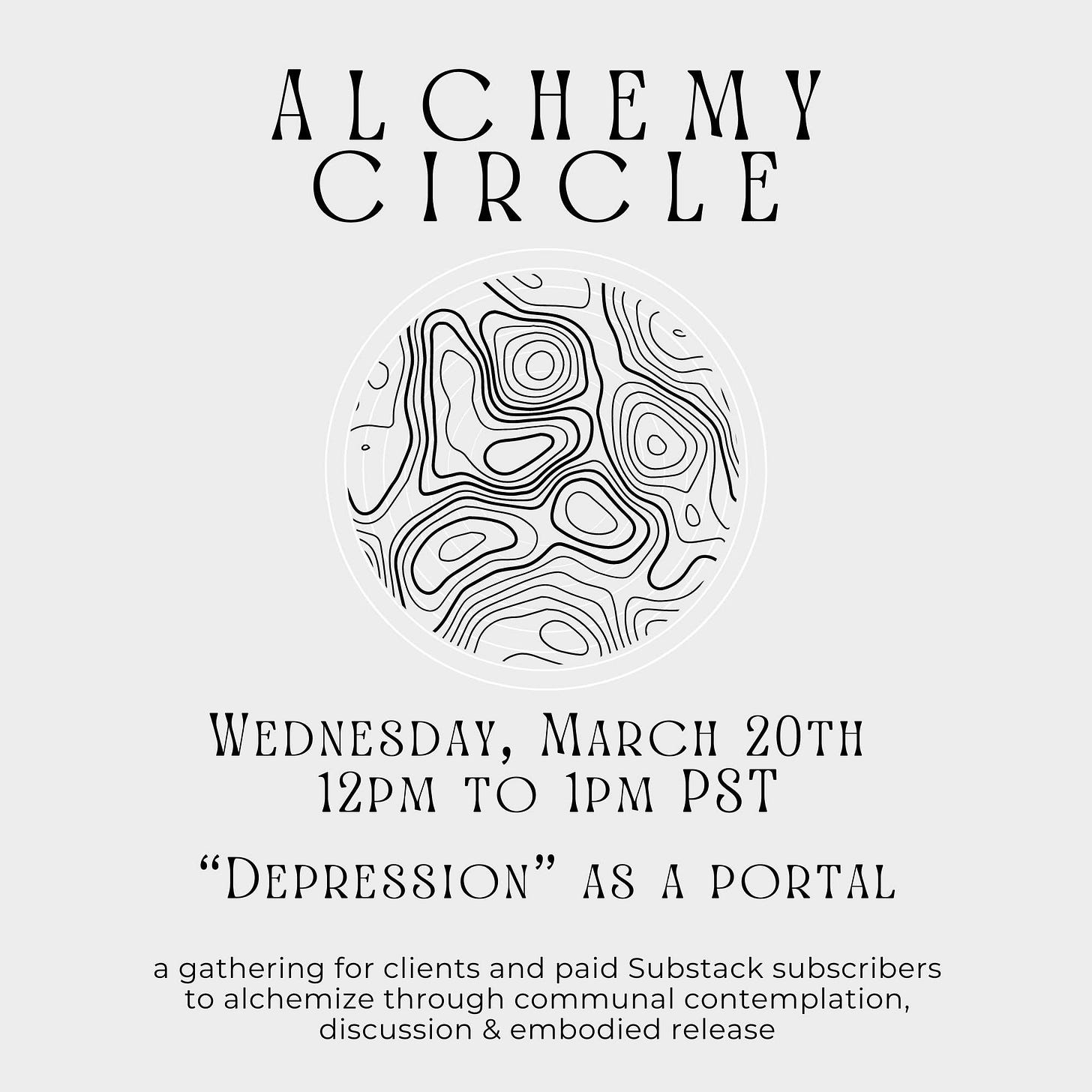This is a talk I gave during February’s Alchemy Circle, a monthly communal space for paid subscribers and clients to alchemize through contemplation, discussion and embodied release. To join the next circle, become a paid subscriber, if you aren't already.
I’ve been intimate with depression- as an enemy and a teacher.
Depression has shrouded me with intrusive thoughts of jumping in front of the BART train every time I stepped on a platform, or quasi-fantasies of being hit by cars while bike-riding to class or the grocery store. That feeling of floating above myself and looking down at a sad, empty shell of a foreign body- which I later learned as dissociation- was frequent and scary. I despised and dreaded my depression as much as I built my identity around it.
At the same time, when I reflect on seasons of my life when depression was so dominant, retrospect reveals how my depression also pushed me out of misaligned work, life paths and relationships. The visitor and teacher of depression urged me to move out of being a force in a corporate system feeding a mission to have people stream more hours of TV and where I felt so isolated from myself and everyone around me. It beckoned me off the narrow path to licensure while I was in grad school (the irony of being in therapy school and experiencing the worse depression of my life is not lost on me) to find a way to practice healing work that was more inclusive and integritous to me. Most recently, it pulled me out of a partnership that was not honest and authentic.
I’m speaking of seasons of depressions from my past, knowing all well, depression may surely visit again and again. I may not be able to see the portals it’s urging me to travel down, though I hope to hold the faith and curiosity that it’s maybe, just maybe, happening for me, and not just to me.
With all of it, depression forced me to explore different ways of seeing myself, being with myself, and caring for myself. It showed me what I might have been allergic to.
As painful as depression is, as heavy and dense as it can feel, and as persistent as it can be…
I’ve found depression to be a portal to greater intimacy, into-me-I-see; seeing into myself and thereby others with a particular kind of love and compassion, even as the dis-ease visits me again and again.
It’s been a mystical portal to deeper alignment- alignment that challenges and disrupts systems of oppression on my body, our bodies and the earth. Depression has led me to the work I do today.
Depression has been a portal to an attuned and sensitive wisdom that this modern world doesn’t know how to hold with grace.
Depression takes on as many faces as humans do.
There are many biological, physiological, chemical, emotional, systemic and spiritual threads to it that cause or perpetuate it. Each of us may experience and express depression differently depending on the season of our individual lives and the cultures we come from.
The message I share here is not meant to invalidate the complexity and nuance of depression or mental dis-ease.
Rather, my intention is to soften the edge that comes with pathologizing human emotions. Sane reactions to the utter dysfunction, violence and crisis of humanity and our planet is depression, anxiety, etc.
Depression can be an allergic reaction to what is misaligned internally and externally.
Misalignment internally happens when my inner critic, ego or internalized oppression is dominant and when my more wise, connected and aware parts of me don’t have space to express themselves. I misalign internally when I fall down the rabbit holes paved by beliefs like “people don’t care about me,” “I’m not enough,” “things won’t change and will always be this way,” “I’m not capable.”
Misalignment externally can be to work environments, relationships, and more largely, the persisting degradation and genocide of the planet and our own humanity- at the hands of humans.
These misalignments internally and externally can reinforce the allergic reaction that is depression, making it more and more dense.
I’ve noticed that I have an allergic reaction to American dairy. When I consume dairy, I get eczema on my hands and feet. I can grieve how cheetos and croissants are no longer accessible for me, and how itchy and painful eczema can be, but if I’m making my eczema “wrong” or bad, I’m missing the misalignment to dairy that my body is communicating (and to the unethical and horrid ways dairy is produced en mass).
Obviously eczema is not depression, and the misalignments that depression might be communicating aren’t often straightforward, clear or tangible. But similarly, if I am making depression “wrong” or bad by pathologizing it or denying it, and if I’m not acknowledging and grieving the pain of depression itself, I am more likely going to be missing the misalignments that my body is communicating.
“It is no measure of health
to be well adjusted
to a profoundly
sick society.”Jiddu Krishnamurti
To feel depressed is to be attuned consciously or subconsciously to the weight of dysfunction, violence, genocide against ourselves, in our close and far relationships and on our one home of planet earth, of this moment in time and even inter-generationally.
Dr. Jonathan Zuess, the author of The Wisdom of Depression, writes that depression can be a “natural and healthy response” to difficult emotional challenges as a “built-in healing mechanism."
Of course, the wisdom in depression is not commonly recognized- not when colonialism is deeply-rooted and systemically pervasive.
The “Age of Enlightenment” during the 18th and 19th centuries brought about new sciences, prioritization of reason and rationale, and an expanding economy through an aggressive global expansion of European colonialism and the transatlantic slave trade. This is also around the time when “depression” came to be viewed as a weakness in temperament that was inherited and could not be changed…
This shows up today as an emphasis on “good vibes only” and “get over it”, and narrow beliefs that there’s “no cure for depression” or that on-going depression is simply “treatment resistant”, and in sooo many other ways in our sick-care, capitalist industrial systems.
So with colonization continuing to be the bane of our human existence, WTF do we do? If depression is an allergic reaction to what is unaligned internally and externally and as big as imperialistic and domination-oriented cultures, how do we take care of ourselves?
Despite misaligned societal, cultural and colonial barriers, we still have agency…
Stephen Levine, a poet, author and teacher best known for his work on death and dying, said, "to heal is to touch with love that which was previously touched by fear.”
Sit with this question for a moment…How do you meet your depression?
Is it a fight response, judgment, rejection, frustration or trying to “fix it” away? A fleeing or avoidant, denying response? With collapse?
Who wants to be met with that energy? I don’t and I want to say no one does… not even the parts of ourselves. Who would feel cared for in that response? And that’s the response we’ve been conditioned to have to sadness, grief and “depression”.
What would it be like to meet our depression with spaciousness, permission, even a welcoming consent?
Rumi speaks to this mystical inquiry in a translation of a poem, The Guesthouse:
This being human is a guest house.
Every morning a new arrival.
A joy, a depression, a meanness,
some momentary awareness comes
as an unexpected visitor.
Welcome and entertain them all!
Even if they’re a crowd of sorrows,
who violently sweep your house
empty of its furniture,
still, treat each guest honorably.
He may be clearing you out
for some new delight.
The dark thought, the shame, the malice,
meet them at the door laughing,
and invite them in.
Be grateful for whoever comes,
because each has been sent
as a guide from beyond.
There are times when I read this poem and immediately feel annoyed, thinking “F*uck that, be grateful?! Meet depression at the door laughing?! Hell NO.”
And…there are times when I can wonder how much I- and we are piercing ourselves with the tenfold suffering of “second arrows” by pathologizing, making wrong, rejecting or fighting perhaps a natural and even wise visitor showing us our allergy to dysfunction and misalignment?
I know the frustrating challenge of trying to decipher depression and what the hell it might be trying to tell me. I’m doing a grave injustice if I deny depression’s complexity and nuance, and the suffering it causes so many of us.
And, I also wonder…what does seeing depression as a portal- an allergic reaction to what is out of alignment, as a visitor that can clean me out for a new delight- leave space for? What unhealed grief or wounds have air then to come to surface and be alchemized?
Spaciousness is deeply important, especially in an age of overstimulation.
The root of the word ‘depress’ means to press down. Depression can be looked at as an energy which is pressing down on the life force within, or it can be a strategy to cope when we feel pressed down or oppressed by our internal and external circumstances.
I sometimes use the metaphor of a mason jar to represent the body- a vessel with limited capacity to hold stuff. The lid has holes in it that represent our various senses, known unknown. Through those holes enter in stimulation from the world, and inside our vessels, stimulation mixes and creates new material based on our inner chemistry (how we make meaning and react to the stimulation in our minds and nervous systems).
We are literally living in unprecedented times when it comes to stimulation. A report by UCSD shows that the average American consumes about 34 gigabytes of data & information every day. That’s about 100,000 words heard or read every waking day; that’s like reading Tolkien's The Hobbit in 18 hours without having the satisfaction of saying “I read a whole book today!”
According to NPR, the human brain can process 11 million bits of information every second. But our conscious minds can handle only 40 to 50 bits of information a second. That leaves millions of bits of info that’s just going to our subconscious every second…That’s a lot of freaking information!!!
It’s said that the body is an extension of the subconscious mind. Our subconscious get expressed in the language of our bodies!
Many of the physiological diseases associated with depression, including diabetes and heart disease, autoimmune diseases and even cancer have inflammation at root. Systemic inflammation is a process when the immune system gets overstimulated. A lot of factors contribute to inflammation, but our practices to decrease stimulation through rest, spaciousness and expression have something to do with our healing.
And when our vessels are limited in capacity- although not fixed in capacity- a pressing down inevitably happens to make space for more and more and more. A density grows at the bottom of our mason jar vessels to make space for all the stimulation that we keep exposing ourselves. This density creates pain and restricts movement, flow, creativity and life force energy. This looks like being in our Dorsal Vagal state of our autonomic nervous system where we are shut down, paralyzed, collapsed, unmotivated, helpless, immobilized, feeling far away in a dark corner.
So how do we remove the lid and let flow in and out?
You probably have practices that work for you to release tension and density. Here’s how I remove that lid to allow for flow in myself and with my clients.
I notice when and how I might be pressing down or repressing.
Non-judgmental noticing or giving attention-to is in and of itself a nervous system regulation practice. We can catch ourselves when we’re pressing down.
I press down on my primal urge to release trauma or density from my body by judging or resisting my human feelings, filling myself up with more stories and analysis of my human experiences, and over-stimulating myself with media (news, social posts) and food (like the spiciest, saltiest food). I hold it in, shit gets stored in my tissues from years ago, and I wonder why I feel so sad.
I shake like a gazelle that looks possessed.
I let my body move, shake, yawn, express, scream, laugh, cry.
Animals are such teachers and muses here; they don’t give a shit if it’s “impolite”, if they look crazy, or if the time is “inconvenient”. They primally shake, tremble, and release after a trauma (in the gazelle’s case, being handled at the neck by a hungry predator)… and they trot on lighter.
As animal bodies, we absolutely need this to release tension, trauma and density stuck in our vessels.
I give myself space from over-stimulation.
My time in meditation and quietness, my media fasts, food fasts and habit fasts are all ways I decrease stimulation.
This can be challenging when stimulation as my coping strategy, or when overstimulation is normalized and feels like “regulation”.
Yet, when I let myself acclimate to less stimulation, I give myself space and time to air out the density that’s been pressed down.
And in this space, I’ve noticed that I, and many folks I’ve worked with, have access to more of our natural and inherent truth, love, authenticity, creativity and intuitive wisdom! This part is so magical! We re-discover the goodness and power that’s always been there, underneath layers and layers of stimulations that turned to dense, sticky icky in the body.
I seek out space-giving community and receive embodied support.
I’ve had an issue with talk therapy because it can easily just reinforce and dwell in the mental stories. So in my work as a therapeutic facilitator, and as a client myself, I prioritize, create and invest in spaces that let us release, shake, move, reflect, dance, sing, scream, notice, and track the alchemy of our nervous systems.
Some of my favorite spaces have been in Mosaiceye Collective, Satya Yoga Cooperative and Interplay.
The thing is, folks who experience depression have a level of attunement to the world that can be profoundly wise, mystical and intuitively powerful, especially when it’s regarded as such. Research shows that people who are highly intelligent are also more prone to depression and anxiety. This is tied to the level of sensitivity to the environment and to life itself.
My sensitivity requires me to be devoted and diligent to airing out my mason jar with mindful boundaries, movement and expression. When I cultivate spaciousness in my life, I’ve witnessed time again how I am receptive to bits of wisdom that informs my healing art and a regulating way of being.
When we choose to see depression as a portal, what becomes possible for us in relationship to ourselves, to healing justice, and collective liberation?
Have some thoughts or feelings to share about depression? Please reach out, I’d absolutely love to hear from you 💙 And if you’d like to be in circle about this topic, join us for the next Alchemy Circle.








